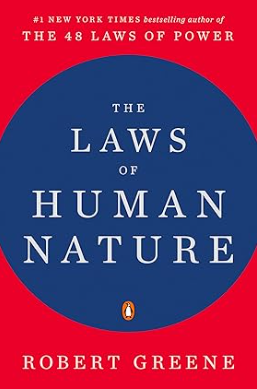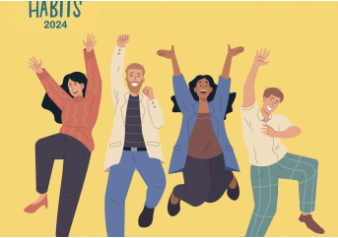Economic and Social Changes
Did the Pandemic Make Us Less Friendly?
A new study observed rapid changes in personality during the pandemic, with people becoming less open, conscientious, agreeable, and extraverted.
BY JOLANTA BURKE | OCTOBER 12, 2022
For many of us, some personality traits stay the same throughout our lives, while others change only gradually. However, evidence shows that significant events in our personal lives which induce severe stress or trauma can be associated with more rapid changes in our personalities.
Continue reading...Greater Good Magazine, Science-based Insights for a Meaningful Life
The Laws of Human Nature by Robert Greene

From the #1 New York Times-bestselling author of The 48 Laws of Power comes the definitive new book on decoding the behavior of the people around you
Robert Greene is a master guide for millions of readers, distilling ancient wisdom and philosophy into essential texts for seekers of power, understanding and mastery.
Now he turns to the most important subject of all - understanding people's drives and motivations, even when they are unconscious of them themselves.
We are social animals. Our very lives depend on our relationships with people. Knowing why people do what they do is the most important tool we can possess, without which our other talents can only take us so far.
Drawing from the ideas and examples of Pericles, Queen Elizabeth I, Martin Luther King Jr, and many others, Greene teaches us how to detach ourselves from our own emotions and master self-control, how to develop the empathy that leads to insight, how to look behind people's masks, and how to resist conformity to develop your singular sense of purpose.
Whether at work, in relationships, or in shaping the world around you, The Laws of Human Nature offers brilliant tactics for success, self-improvement, and self-defense.

How to Stick to Your Resolutions in 2024 (The Science of Happiness Podcast)

We explore how the science of behavior change can help us form new habits and be happier while doing it.
Join our limited newsletter The Science of Habits to get curated, science-backed tips to help make your New Years resolution stick in 2024.https://ggsc.berkeley.edu/podcasts/habits
We explore how the science of behavior change can help us form new habits and be happier while doing it.
Link to episode transcript: http://tinyurl.com/4e294mdt
Warren Buffett's Best Advice to Improve Your Mind and Body
by Marcel Schwantes
The Oracle of Omaha offers wisdom on boosting our mental and physical health in the age of burnout.
Warren Buffett once shared a story, not about investments or business deals, but about a genie and a magical car. As Warren tells it, at the age of sixteen, a genie appears and offers him any car he desires.
Now, Warren being Warren, he'd approach this opportunity with a hint of skepticism. "What's the catch?" he asks.
Well, the genie reveals that this is the only car he'll ever have, and it has to last a lifetime.
Warren chooses the perfect car, of course. But here's the twist - he'd treat it like gold. He'd read the manual not once but five times, keep it safely tucked in the garage, and fix any dent or scratch pronto to prevent rust. Why? Because this car has to last a lifetime. This is all captured in Buffett's biography The Snowball: Warren Buffett and the Business of Life.
The link to our mind and body
Now, let's shift gears. Warren shares in his famous fable that you are in the same position as his imaginary car. He says, "That's exactly the position you are in concerning your mind and body. You only get one mind and one body. And it's got to last a lifetime. Now, it's very easy to let them ride for many years. But if you don't take care of that mind and that body, they'll be a wreck forty years later, just like the car would be."
Life lessons Warren Buffett imparted to his children
Think about it. What you do today shapes how your mind and body will operate in the decades to come. So, take a page from Warren's book (or manual, in this case). Treat your mind and body with the same care and attention. Nurture them, invest in them, and fix any dents in your well-being promptly. Because, just like that magical car, they're in it for the long haul. And the decisions you make today determine how smoothly they'll run in the future.
Here are five ways to do it:
1. Commit to your personal development
The journey toward mind-body wholeness is not an easy one. If you want to keep that body from rusting and being a wreck years later, you have to commit to improving it; this requires a commitment to change and having a plan to maintain those changes every single day, consistently.
Commitment to personal development is hard. You have to stop and ask yourself: What's important to me? What do I want to achieve in my life, my health, my well-being, my spiritual life? What improvements do I have to make to reach that goal?
2. Take power naps
The New York Times reported in 2013 that daytime naps boost performance. In studies mentioned in the article, when night shift air traffic controllers were given 40 minutes to nap -- and slept an average of 19 minutes -- they performed much better on tests that measured vigilance and reaction time.
3. Play more
How often do you incorporate play during your regular work routine? I used to be hyper-productive and a workaholic. Play wasn't even a blip on my radar, but it should've been.
According to Stuart Brown, founder of the National Institute for Play and author of Play, science has shown that playful ways of working lead to more creative flow and innovation. He argues that play is a "biological drive as integral to our health as sleep or nutrition" and adds that "we are designed by nature to flourish through play."
4. Pause and breathe
Remember to pause and take a slow breath whenever you feel overwhelmed or distracted. Research suggests that slow breathing through your gut can help you refocus and improve your ability to concentrate by interrupting automatic thinking (and negative thoughts).
5. Kill the hustle mentality
In a time when being busy is seen as productive and entrepreneurs everywhere model their work habits after the Silicon Valley hustle culture, it can be difficult to pull away and take a break. Now more than ever, people are experiencing real burnout due to overwork.
Tesla CEO Elon Musk is famous for sleeping on the factory floor during "production hell" and considers working 80 to 90-hour weeks to be normal. Uh, no, Elon, that's not normal; it's completely nuts.
What's considered normal is having a holistic lifestyle by putting limits on the number of hours you work so you can be a productive human being--in all facets of your life, including work.
Remember, taking care of your mind and body (self-care) won't happen unless you intentionally make time for it. When you do, you will show up to work and personal life fully present and alive, and ready to conquer each day.
This post originally appeared at inc.com.